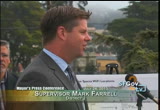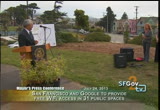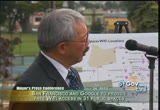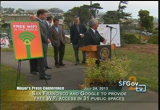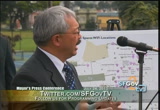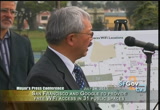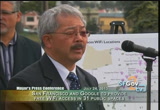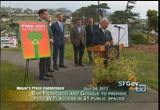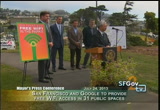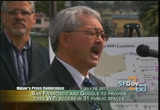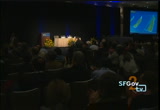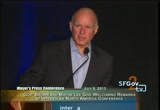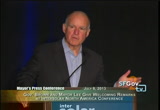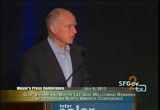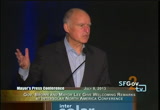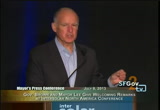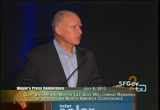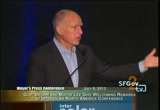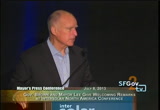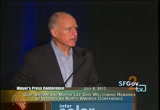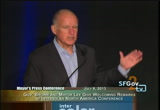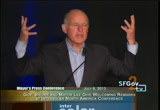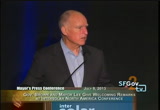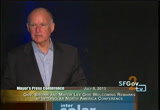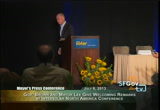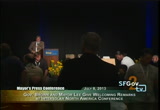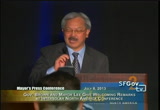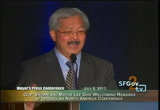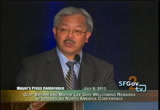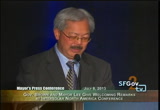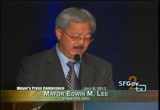tv [untitled] August 9, 2013 6:30am-7:01am PDT
6:30 am
san francisco to make not only in wi-fi, but other technology projects to bring to the residents of our city that the mayor certainly has taken a lead on as well and played an integral role in this. public private partnerships are a way to make this happen. special thanks to google for making this a public private partnership we can be proud of here in san francisco. this is truly a gift and, again, we say that with no strings attached. and that makes a big difference to the residents of san francisco and for us as elected leaders implementing those projects. it makes it a lot easier for us to get them done. >> mayor, [speaker not understood]. >> as i said, it's a good beginning. and of all people, both mark tuitu, phil ginsberg and others know it's a constant investment in technology that we have to make. and every company knows this as
6:31 am
well as government and we're going to make -- you know, this is part of our infrastructure now. and, so, i've been an infrastructure mayor. i've been part of that infrastructure. it's not just freeways and bridges. it's telecommunication, information, infrastructure that we have to constantly invest in. you asked earlier what the vision was. you know, for me i've always had a very strong vision that every child that is here in san francisco, every school, every educational institution should be at its highest level of skill setting for the 21st century of a city that is an innovation capital of the world. that means we have a lot of work to get done in our schools. we have a lot of work to get done in every corridor, every neighborhood. we still have a serious digital divide in the city and in the bay area, and we're going to get everybody up to speed so that everyone who lives here and wants to be here can also
6:32 am
succeed in technology is going to be a key to it in every single industry. whether it's tourism, biotech lifesciences or technology itself. >> [speaker not understood]. >> oh, absolutely, that was the whole reason why i touted that we have 600 members of sf city. alex, i think maybe in a year we'll see 800 members of sf city. there is 1,800 technology firms in san francisco. it continues to grow. they employ over 45,000 people. and i think people want to be here because they want to continue innovating with us. at the same time, as government and as service providers, we're going to continue asking for help from the private sector and be our partners. and i think that's going to help us with infrastructure as well as maintenance and services. >> as you know, [speaker not understood].
6:33 am
what exactly did you mean by that? >> well, i think we will always have a relationship with our business community. i go to them when i need to create 6,000 jobs for our kids in the summer. i'm backed up by the board of supervisors for that. we have very serious needs in the city, and we don't have all the resources. so, we hope that there will be a very good relationship that's established between the private sector and the public sector. having said that, on issues like providing free wi-fi, when we say no strings, it's kind of like the past conversations we had. we didn't want any inappropriate advertising on things or things that we felt were of value to us that we wanted kids and others to be able to have a free access to without, you know, the -- maybe
6:34 am
the dressing up sometimes that we see happening in the marketing world. those will be ongoing discussions that we have and these are discussions that we always have with our business partners, is how could we do it this way so that we provide, you know, the right message that we all wanted to send. to me, it is all about messaging. and i know businesses need help from government as well. i've been in those discussions where a lot of them said, hey, you're taxing us to death. we did a big payroll tax revision as a result of that. there is just simply -- i think a relationship where there's no quid pro quo, we do it for good policy reasons that we articulate and are clear about. and that's the way we should be running government. that's also the way we should have that clean relationship with businesses. >> mayor, [speaker not understood]. >> yeah, i mean that's why we
6:35 am
hired mark tuitu for [speaker not understood]. my competitive spirit with mayor bloomberg in new york, rahm emanuel in chicago, we're always exchanging information about you got this, you got that. our staffs and our department heads do the same. , and so, we're always saying, they did this. how come we can't do that? and the message gets shared with neighborhood leaders as well ~. so, i get this a lot from neighborhood leaders, how come we don't have wi-fi in all of our parks? how come you always concentrate on golden gate, for example, but not on balboa? these are the kind of things i think we're wanting to make a statement on. i think, for example, our police department a we're working on with technology, another good example. one of these days we're going to have officers be able to dot reports while they're in their vehicles in the streets rather than coming back to their stations and spending 2 or 3 hours trying to do all the reports ~.
6:36 am
we're working on that right now. but, you know, i think any city who needs the resources at their highest performance will look towards technology to help us reduce what we're doing today that could be done faster, quicker, and more efficiently and just as thoroughly. >> mayor, i think you answered this already, but i didn't quite hear her question. google is going to provide the financial [speaker not understood], correct? >> yes. >> after that what happens? >> well, first of all, i think we will make whatever proper investments we will have because we will consider this to be part of the infrastructure of our parks and recreation. as we do wi-fi in neighborhood corridors, we have infrastructure there. so, when i say that we are responsible, the city is responsible for infrastructure, we will then pay to maintain that infrastructure, particularly if residents and the visitors depend upon that infrastructure to work in a certain level.
6:37 am
having said that, it doesn't the necessarily mean that we say, okay, the general fund has got to pay for this. that is why i'm touting the membership of sf city, our technology companies. i will tout the membership of the chamber of commerce. i will tout the membership of the community benefits district and the businesses along the corridors that we want to improve. all of them are partners to help us figure out how to maintain all the infrastructure that we want to put in when we know that the goal is improve services for the residents. so, i suggest that it isn't necessarily going to be reflected in increase to the general fund. it could be healthy relationship with business community to help us maintain that. yes. >> [speaker not understood].
6:38 am
>> well, i think google is happy to do this for the reasons already touted. they agree with us that wi-fi in our parks is a very important, very notable, very honorable goal to accomplish. they stepped up as a member of sf city. part of a whole group of technology partners that want to help our city improve our services. and i think that when companies step that up, just like other companies have done where they lend their employees to sweep our streets, to pick up trash, to help with the arts community improve along mid-market, they're all saying they want to be great partners in the city that accompanies, as companies that employ our residents, they just want to be great partners. and i think that that's a worthy, worthy spirit and goal. it is what i consider to be one
6:39 am
of the finest spirits of san francisco being part of this incredible community partnership. >> so, i thank you guys. i know we all have a number of appointments to go to including signing our budget that we just passed out. so, thank you all for being here. i think we'll be here a few more minutes to answer questions if you want. thank you all for coming and look forward to making this project a reality. thank you, everyone. (applause) (applause) >> well, thank you and welcome to california.
6:40 am
it's a great place to come and talk about solar energy because we are in the forefront of certainly the rest of the states, probably -- in fact, certainly in the western hemisphere, california is in the lead. and that's important. but being in the lead doesn't mean we've arrived at the goal. got a long way to go and i hope the work you do here, the conversations, the relationships that are formed can help advance the cause of solar energy and renewable energy or generally. back when i was governor the first time, that was a long time ago -- some of you folks weren't even born then -- not too many. i see a few gray hairs here who are hanging around. that was a long time ago, 38 years ago, as a matter of fact. very few people get to be governor 38 years after they first started. [laughter] >> with a 28-year hiatus. (applause)
6:41 am
so, i guess i have to expiate my many political sins and i spent time in the wilderness. but i am back and i can reflect on how politics work, how it worked then, what's happened in the meantime, challenges we now face. i promoted solar energy back in 1975 when i signed a law that granted a 55% tax credit to the installation of solar. that time was mostly solar hot water. but 55% was a credit, not a deduction. so, you took it right off your state income tax. probably the biggest incentive that has ever been provided. but over the years times change, but still california at that time was leading the way in solar and building efficiency, and then very
6:42 am
shortly after 1982 promulgated appliance efficiency standards. so, we did get the sense of renewable energy, efficiency, elegance in the way we handle resources. today, of course, we know a lot more. we know about climate change. we know about population, several billion more. we know if the demographers are right, the world will add 2 billion people. we now have 2 billion cars. the last time there were a couple hundred million cars. in fact, cars are reproducing faster than people. [laughter] >> and as long as they're using oil we've got a problem. that's why in california we have a goal to have a million electric vehicles by 2025. (applause)
6:43 am
>> so, that's -- just within the last two months, we actually recorded over 2000 megawatts of solar energy being put into the grid, which is more than [speaker not understood] provided. (applause) >> of course, the solar works for six hours or so and nuclear works for, you know, four times as long. however, it leaves a little bit of a tail afterwards that has to be dealt with. so, but it's an important milestone. and california does have the goal of 33% renewable energy. we have the goal of a million solar rooftops. we already have over 130,000 installations on homes and small businesses. so, we're looking at utility,
6:44 am
scale, installation of solar, we're looking at individual homes, and businesses. so, wherever we can, we are encouraging it. we're number oned in the country. we're going to keep on going. it's very critical. now, i know from the idea to the execution to the secure realization, it takes a long time. and we have to have patience. we have to have staying power. so, that's the dilemma. we look at most of the countries. germany certainly an exception, but most are not stepping up to the plate. there is a complete disproportion between the knowledge and the magnitude of the knowledge about and the magnitude of climate change and what it's going to do to the way -- to our way of life and our response. the response is feeble compared
6:45 am
to the challenge, and we've got to wake up to that fact. (applause) >> the challenge -- one of the challenges is climate change is not news because it's too slow. news is fast. it's what happened yesterday. climate change has been happening gradually over time. there's a lot of other stuff that's going on that gets people all excited and i'm not saying you shouldn't get excited about a lot of trivial things. why not? it can distract you from other trivial things. [laughter] >> it may be more irritating. but still, we have to think of what's important and what our responsibility as human beings are. it's not just fun and toys and entertainment and shopping. there's some serious stuff that men and women in this world
6:46 am
have to deal with, and those things [speaker not understood], producing food, creating safe environment, schools, medicine, but energy is certainly one of the pillars of modern civilization. and there's a lot of oil in the ground. if we wait for peak oil to save us, we're done because we've got plenty oil. i remember somebody told me once, a stanford professor, our problem is not too little too late when it comes to oil, but it's too much too soon. in other words, there's plenty there. so, that's the problem. you've got something easy, coal, 40% now, but it's grown a lot. coal is pretty simple stuff. if you can't burn it in america, put it on a train, ship it over to china or india. so, we got market forces. and against that we have to
6:47 am
marshal intelligence and collaboration and political response, because this stuff is serious. and the fact that people aren't worried about it and don't talk about it doesn't mean it isn't serious. and that's the insidious character of this -- of this challenge, that some people know about it, 90, 97% of the scientists who deal in climate science all agree that when it comes to doing something it takes leadership. and not just political leadership, but business leadership, church leadership, academic leadership. and that's the context, i believe, in which you have come together. you're focusing on solar energy. that's a big piece. there's plenty of sun out there to take care of our energy. it's going to take time. it's going to take technology. it's going to take scientific breakthroughs, research, and development. and it's going to take storage.
6:48 am
and it's going to take various insebastianvv stifle. just in california you have some cities that charge 1800 bucks for a permit for somebody to put solar on their roof. we have to fight that. there are soft costs. we can bring that down. from the small incremental step to the long march in getting it done, those are all the elements that you have to deal with. and there are some pauses, sometimes things plateau. i know some utilities feel we have enough for 33 and a third percent which is our state goal. we have to find other states. we've got to get other people putting out that 33% renewable standard. we've got to get -- and we do, we have a law in california encouraging storage because we can't just rely on the sunlight. (applause) >> we've got to bottle the sunlight. you've probably heard about that.
6:49 am
we're bottling sunlight. well, that' a metaphor for storage. but we can get it done. you know, in a time of war when the invading army comes, people rise to the occasion. but when the invasion is more subtle and more gradual, then what? then it takes clarity, it takes courage, and it takes will, a lot of political will, a lot of personal will. and that's what i would urge upon all of you. you've got your businesses or your academic work. all of it has to flow into this transformation because climate change is happening. it's affecting the food supply. we have the number of people going up, the number of oil-fed cars going up, but we have food production now lagging behind. and, so, we're going to have to slow climate change while we take care of all these other economic challenges.
6:50 am
and it's very easy to say, well, we can't turn off coal. we can't go to solar. it's too expensive. well, you wait 10 years, you wait 15 years, it's going to be a lot more expensive, a lot more. so, how do we take the future and bring it forward so that we can act on the basis of what we certainly expect? and when i say "we," it's not we all of the people. it's we, a relatively small subset, people in this room, people throughout the country, but in rather limited numbers. and, so, you not only have to do what you're doing, but you've got to find a way to market the very idea of solar energy. the very idea that we have all the energy we need, we have to develop the technology to utilize it without at the same time filling up our atmosphere
6:51 am
with methane and co2 and nitrogen oxide and all the other emissions and pollutants that are going to reshape what life on earth is. when you hit 400 parts per million, as we did as reported by the monitoring stations over in hawaii, it hasn't been like that for 3 or 4 million years. when it was like that 3 or 4 million years, the sea was a lot higher. the ice at the poles was a lot less. so, we've got a lot of evidence. we've got to find now the step-by-step sequential movement toward the goal. and the goal is an energy system totally compatible with the rules of nature. (applause) >> we've got to get on the side of nature. (applause) >> now, a lot of people like to have fight nature, but we are
6:52 am
nature. when we fight nature, we're fighting ourselves. we're fighting our own life support system. that's really the challenge here. so, it's business. it's our livelihood, but it's also a calling to wake people up, to make the kind of progressive steps that are crucial to make sure that we keep going. so, we have 130,000 solar installations. we're going to get several hundred thousand more. and as governor of california, i guarantee we're going to get there because i'm going to move us out of all the obstacles. whoever, whatever they are, get out of the way. the sun is shining brightly in the state of california. [cheering and applauding] >> all right. the only thing i want to say is when you introduced me, i could
6:53 am
hear your german accent. [laughter] >> i just want to say, i'm going to germany next week because i still have a few distant relatives from my great grandfather, auguste schechman who came to california in 1882, a lot of us running around, some known as brown. i'm going to reconnect with my inner person. we're going to need the indomitable will to overcome the blindness that stands in the way from our obvious destiny and future which is in renewable, sustainible, solar america and solar world. thank you very much. [cheering and applauding]
6:54 am
[cheering and applauding] >> i just want to say i am humbled to have been able to introduce governor brown and very, very happy. you have here a room and concern, 20,000 people visiting who are all on the same line. thank you so much again. >> thank you. (applause) >> please don't leave the room. the governor, of course, has a tight schedule and has to leave us. but i am very, very encouraged. i think we couldn't have opened
6:55 am
solar in any better way. this is really simulating from somebody who has really shown in all his life and all his professional achievements that this is the right direction. so, i'm very happy to introduce as our next speaker our distinguished mayor from this wonderful city of san francisco in which the california sun shines. i don't have to introduce mayor lee to you. but i have to mention i found in your cv that you are a graduate from u.c. berkeley from 1978. welcome. we have a line up of berkeley graduates. (applause) >> well, thank you for that introduction, dr. weber. and if there's any doubt in your mind as to how governor brown figured out the budget, you just heard it. that's the power of his leadership. good evening, everyone, and
6:56 am
thank you for your attending the 2013 inter-solar conference here in san francisco. and first i want to give my personal thanks to the governor. just a couple weeks ago, by the way, all of the mayors from the top 10 city in the state of california met with him just a few weeks ago and we had on our mind a discussion with him about the economy, our budgets, our economic challenges. well, before we could sit down at his picnic table meeting room -- if you've ever met with the governor, you should realize he doesn't have an ordinary meeting table in his office. he has a picnic table. and if you know picnic tables, they're very hard to sit on, and he explained as he sat us down, i have a picnic table here because the hard seats make you not want to sit here too long. [laughter] >> so, be quick with what you have. and before we were even able to
6:57 am
express all of our concerns, he was at it. just deja vu a minute ago. he said, i want to talk to you mayors about climate change. and immediately he thrust into handing out a report to each and every one of us and asked us, you read this. and i know all of you are committed, but i don't want b.s., i want you to make sure you start paying attention to the science of climate change. and, so, he handed out a report. it was titled the scientific consensus for maintaining humanity's life support systems in the 21st century. and it was authored by worldwide scientists across the world, evidencing their confirmation that we're in big trouble and we need to do more for our environment. and this is -- he led the conversation off with that. so, we not only could not avoid it, we had to be very happy about listening to him about this in order for us to get our
6:58 am
agenda done. but that's how committed our governor is. and you saw it right here, the passion. this is leadership. this is what we are all doing and i am very happy to join him in making sure that that 33% gets done. well, in fact, we're not satisfied here in san francisco with 33%. we want 100% renewable energy in san francisco. (applause) >> and we will get that done, i assure you. climate change continues to be one of the most important issues and that is why this inter-solar conference has its sixth meeting here in san francisco. you know our passion for this. you know this is part of the dna of how we run our local government. i'm honored to be welcoming all of you back here to our great city, and i want to again thank dr. weber and his wonderful staff and speakers from the state and from other scientific fields will be here to address
6:59 am
you in a moment. but there is no better place for the solar industry than to really come together and meet right here in our great city. we are home to more than 19 megawatts of solar installation, and over 21 1 clean tech companies that are driving innovation for the rest of the world right here in san francisco ~. we are bold, and we're not afraid to be bold. that's why we are moving to 100% renewable energy in our city. we want to reduce our carbon. we want to green our buildings. and we want to become a mecca for clean transportation. this year we are proud to be the number one spot on the clean edge u.s. metro clean tech index for all cities in the continental united states. our city has launched effective and powerful solar programs, and we've set an ambitious clean energy goal of having 100% city-wide electricity come
7:00 am
from renewable sources within the next 10 years. in the past decade, we've already begun this effort and we systematically have been building out our renewable energy sources. since 2004, our city has installed 13 municipal solar rays, totaling about 7.4 megawatts of solar energy generating capacity. this includes 5 megawatts solar system in our sunset reservoir, which is our largest and one of the largest urban municipal solar arrays in the state of california when it was first installed. in fact, i think some of you may be visiting the sunset reservoir on your visit this time. additionally, our solar sector incentive program, go solar s.f., has been working very hard in our city. in fact, in 2007 when it first
36 Views
IN COLLECTIONS
SFGTV2: San Francisco Government Television Television Archive
Television Archive  Television Archive News Search Service
Television Archive News Search Service 
Uploaded by TV Archive on

 Live Music Archive
Live Music Archive Librivox Free Audio
Librivox Free Audio Metropolitan Museum
Metropolitan Museum Cleveland Museum of Art
Cleveland Museum of Art Internet Arcade
Internet Arcade Console Living Room
Console Living Room Books to Borrow
Books to Borrow Open Library
Open Library TV News
TV News Understanding 9/11
Understanding 9/11